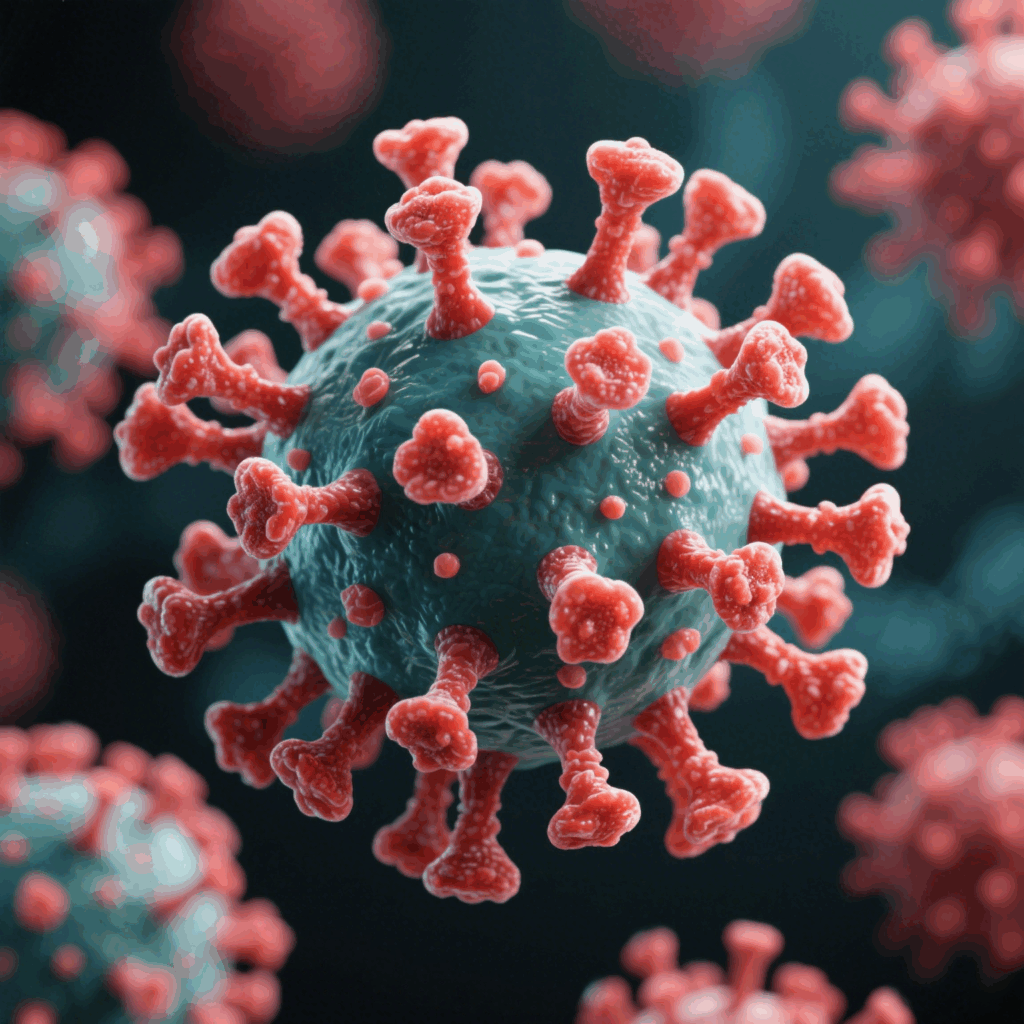Answer: Yes, it is possible to be a surrogate with HSV (Herpes Simplex Virus), but certain precautions and medical management are necessary to ensure the safety of both the surrogate and the baby.
Introduction
Surrogacy is an incredible and selfless way to help others build their families. However, becoming a surrogate involves medical screening to ensure the health and safety of both the surrogate and the child she carries. One common question that often arises is whether individuals who have Herpes Simplex Virus (HSV) can still be eligible to become a surrogate mother.
In this article, we will discuss what HSV is, whether it disqualifies someone from becoming a surrogate, and how surrogates with HSV can manage their condition throughout the process to ensure the best possible outcome for everyone involved.
More: How to Become a Surrogate Mother in Houston: Requirements & Process
Understanding Herpes Simplex Virus (HSV)
What is HSV?
Herpes Simplex Virus is a common virus that causes sores and blisters, typically around the mouth (HSV-1) or genital area (HSV-2). While HSV can be spread through intimate contact, it is highly prevalent — many people who have HSV are asymptomatic and may not even know they carry the virus.
Types of HSV
- HSV-1: Often causes oral herpes (cold sores around the mouth).
- HSV-2: Typically causes genital herpes, but both types can affect either area of the body.
Most people with HSV can live their lives without complications, but during pregnancy, or when someone is trying to conceive or become a surrogate, it’s important to manage the condition to reduce any risks.
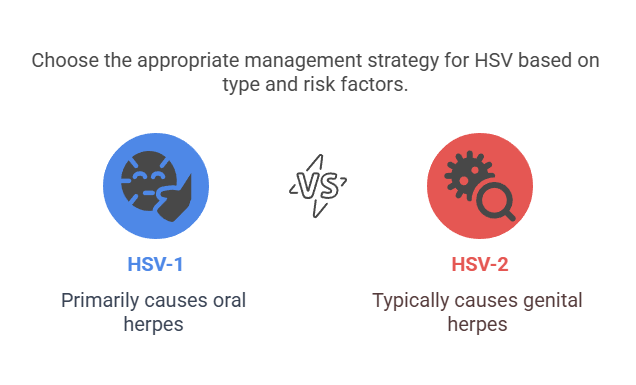
Can You Be a Surrogate with HSV?
The short answer is: Yes, you can still be a surrogate with HSV. However, like any other medical condition, there are guidelines and precautions to ensure the health and safety of both the surrogate and the baby.
More: Can You Be a Surrogate After Tubal Ligation?
Here’s how surrogacy with HSV works:
- Medical Screening is Key
Before becoming a surrogate, a thorough medical screening is required. This includes testing for conditions like HSV. If the surrogate has HSV, her healthcare provider will monitor her condition closely throughout the process. Surrogates are not automatically disqualified from surrogacy simply because they have HSV, but they must be prepared to manage it. - HSV Does Not Affect the Baby’s Genetics
Gestational surrogates, those who carry a baby conceived from the intended parents’ or donors’ eggs and sperm, will not pass HSV on to the baby genetically. The only concern would be transmission during pregnancy or childbirth. - Precautions During Pregnancy
The risk of transmitting HSV to the baby is highest during delivery, especially if the surrogate has an active outbreak of HSV-2 (genital herpes) at the time of birth. However, with proper antiviral medication and precautions, this risk can be minimized. In fact, antiviral treatment during pregnancy helps prevent outbreaks and reduces the likelihood of transmission. - Consultation with a Healthcare Provider
Surrogates with HSV should work closely with their medical provider, who may prescribe antiviral medications such as acyclovir or valacyclovir. These medications are commonly used to reduce the frequency of outbreaks and make it less likely for the virus to spread during delivery.
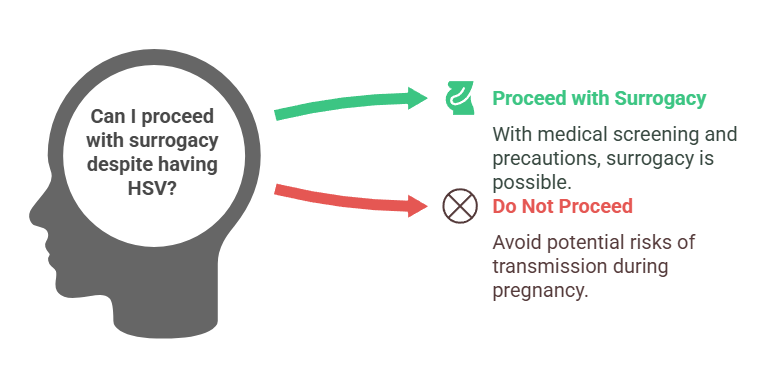
Managing HSV During Surrogacy
- Before Pregnancy:
- Consultation: Before becoming a surrogate, the surrogate mother must disclose any known conditions like HSV to the agency. The medical team will assess the risk based on the type of HSV, history of outbreaks, and any other relevant health factors.
- Preconception Care: If the surrogate has HSV, it’s essential to be on antiviral medication to reduce viral activity before pregnancy begins. The goal is to enter pregnancy with minimal or no active viral shedding.
- During Pregnancy:
- Regular Monitoring: Throughout the pregnancy, healthcare providers will monitor the surrogate’s condition and ensure there are no active outbreaks.
- Avoiding Outbreaks: If an outbreak occurs, it’s crucial to manage it with antiviral treatment to minimize the risk of transmission to the baby.
- Safe Birth Plan: If the surrogate has an active genital outbreak at the time of delivery, a caesarean section may be recommended to prevent HSV transmission during vaginal delivery.
- After Pregnancy:
- Postpartum Care: Even after the birth, the surrogate will continue to receive medical care to monitor recovery and manage any lingering effects of HSV.
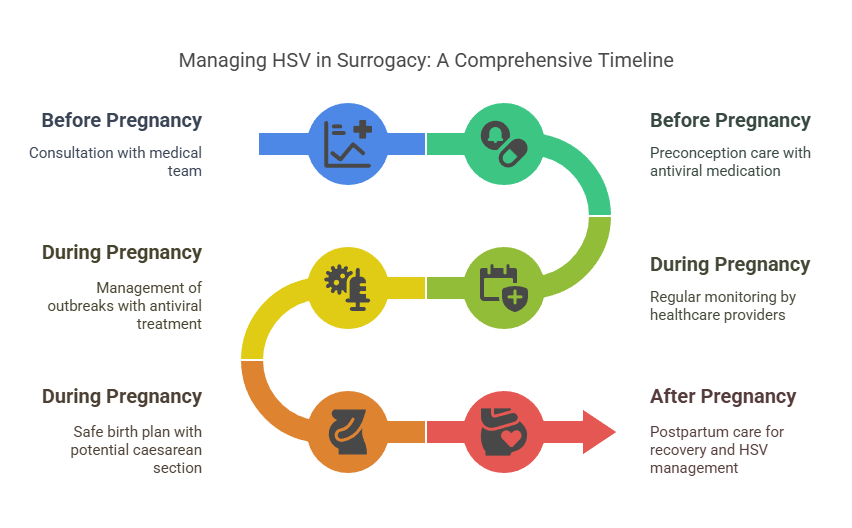
Legal and Ethical Considerations
It’s essential for surrogates with HSV to disclose their condition fully and honestly to the surrogacy agency and intended parents. This transparency ensures that all parties are well-informed and that the surrogate receives the appropriate medical care.
Many reputable surrogacy agencies work closely with qualified healthcare providers to ensure the surrogate’s health is carefully monitored throughout the process. Legal contracts may also include stipulations to address any medical issues and outline the expectations of care.
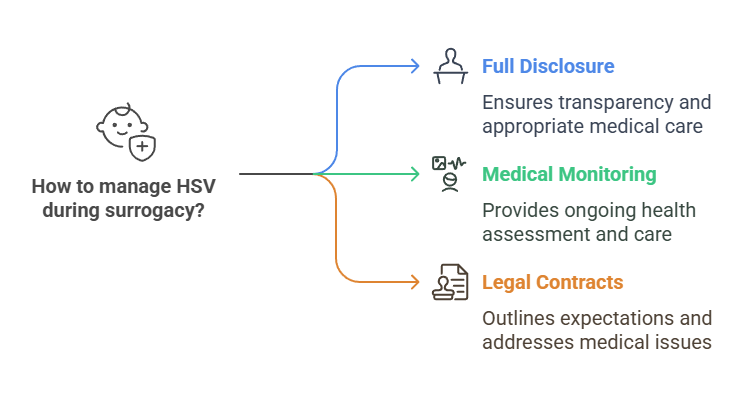
Conclusion
While having HSV does not automatically disqualify someone from being a surrogate, it does require a proactive approach to ensure the health and safety of both the surrogate and the baby. With the right medical care, antiviral treatments, and careful monitoring, surrogates with HSV can still carry and deliver healthy babies.
If you are considering surrogacy and have HSV, consulting with your doctor and surrogacy agency is a crucial first step. They will help guide you through the process, ensuring both your health and the health of the child.

